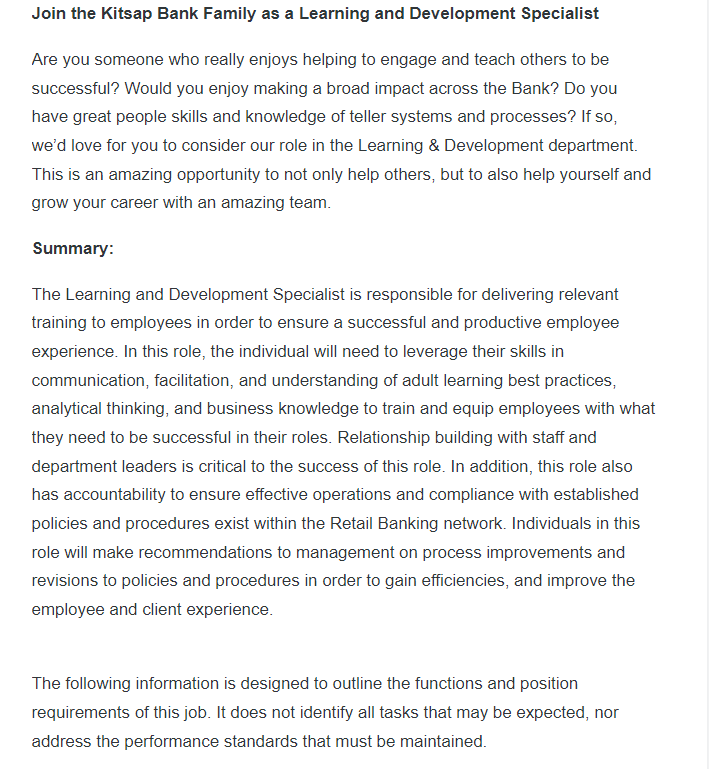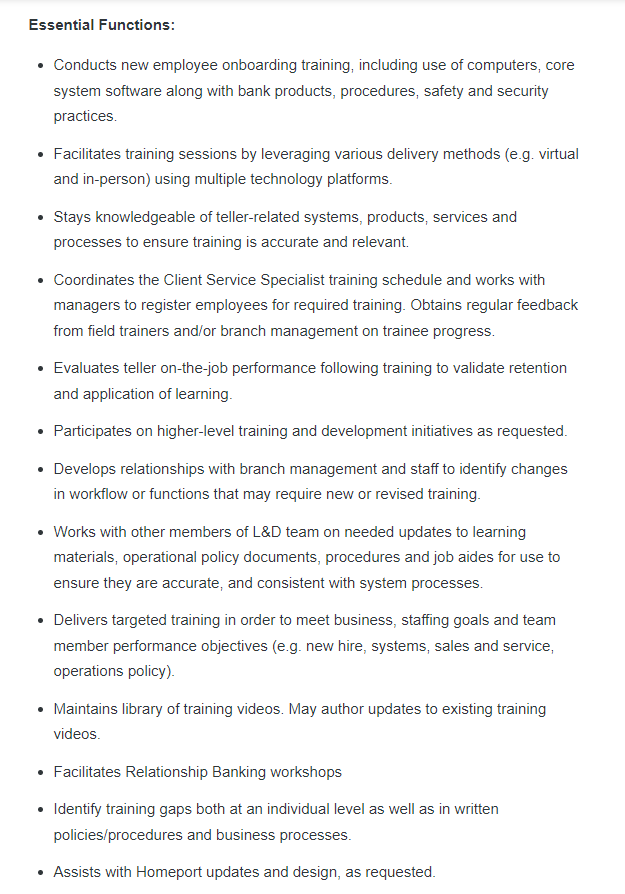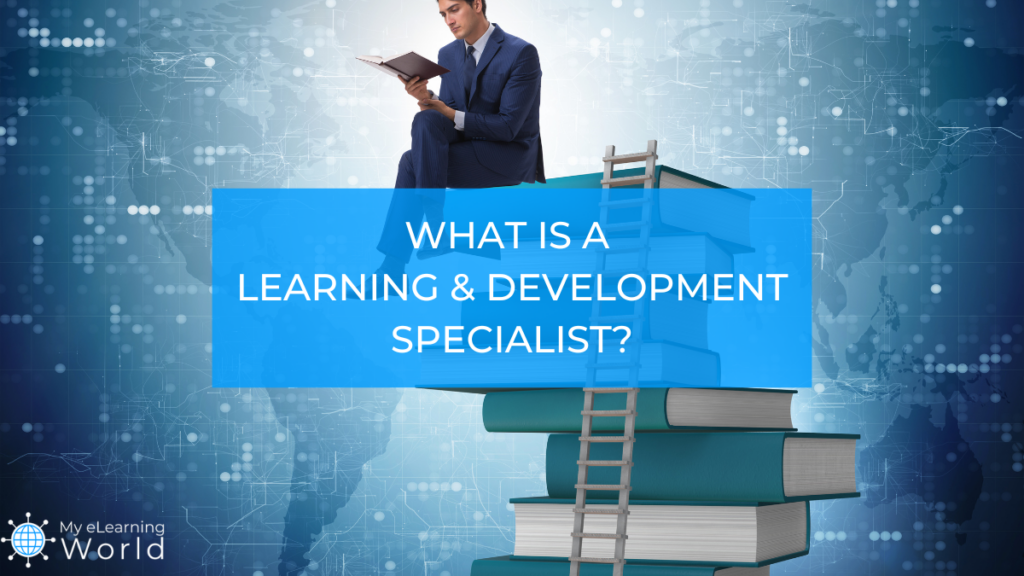The role of learning and development specialist has become one of the most in-demand positions in the training and development/eLearning industry.
But what is a learning and development specialist exactly? What do they do on a daily basis?
There are many different types of learning and development specialists, each with their unique focus and expertise. Some specialize in specific methods or tools, such as e-learning or coaching. Others focus on specific industries or job functions, such as sales or leads.
In this article, I’ll explore the role of a learning and development specialist, including their key responsibilities, skills, and common career paths. I’ll even look at a real example job listing for the role so you can get a better idea of what this type of job requires.
What is a Learning and Development Specialist?
A learning and development specialist (sometimes also called a “training and development specialist” or a “learning and development consultant”) is a professional who helps organizations design and implement training programs that improve employee productivity and effectiveness. The role of a learning and development specialist includes conducting needs assessments, designing training programs, developing instructional materials, delivering training sessions, and evaluating the results of training programs.
Organizations invest in employee training and development to improve employee performance and build a competitive advantage. Not only that, organizations that have great training and development programs often report having much higher employee retention rates than the industry average.
Learning and development specialists play an important role in helping organizations achieve these goals.
When designing training programs, learning and development specialists consider the organization’s specific needs and the employees who will be participating in the program. They use various instructional methods to deliver training, including classroom instruction, e-learning, and on-the-job training. They also develop tools and resources that employees can use to continue learning after the training program has ended.
The Learning and Development Specialist’s Responsibilities
The role of a learning and development specialist can vary depending on the organization, but their responsibilities typically include:
- Assessing training needs–The first step in creating an effective training program is to assess the organization’s needs and its employees. This can be done through surveys, interviews, and focus groups. When needs are identified, the learning and development specialist can create goals and objectives for the training program. Since training programs can be expensive, it is important to ensure that the investment will be worth it for the company.
- Developing and delivering training programs–Once the goals and objectives of the training program have been established, the learning and development specialist can develop and deliver the program. This may involve creating materials, conducting workshops, and providing one-on-one coaching. It is important to make sure that the training is engaging and relevant to the needs of the employees.
- Evaluating the effectiveness of training programs–After the training program has been delivered, the learning and development specialist will evaluate its effectiveness. This can be done through surveys, interviews, and data analysis. The evaluation will help to identify areas that were successful and areas that need improvement. It can also help determine whether the learning and development programs were effective in meeting the goals and objectives of the organization.
- Creating and maintaining learning materials–The learning and development specialist is responsible for creating and maintaining learning materials. This may include books, manuals, articles, videos, and eLearning courses. The materials must be up-to-date and relevant to the needs of the organization. They may work with an instructional designer or eLearning developer during this process, and they may need familiarity with a particular learning management system.
- Keeping up with industry trends–The learning and development specialist must keep up with industry trends to identify new approaches to training and organizational development. They should also be aware of changes in the workforce that may impact the organization’s training needs. By staying up-to-date, the learning and development specialist can ensure that the organization provides its employees with the best possible training.
- Researching new training methods–The learning and development specialist should research new training methods and approaches. They can then recommend the best methods to the organization. This may involve piloting new programs or attending conferences and seminars. By staying up-to-date on new training methods, the learning and development specialist can ensure that the organization uses the most effective techniques.
- Creating flexible learning interventions–The learning and development specialist should create flexible learning interventions that can be customized to the organization’s needs. This may involve creating different versions of the same program or course. It is important to make sure that the interventions are relevant to the employees and meet the organization’s goals.
- Managing budgets–The learning and development specialist may also be responsible for managing the budget for the training program. This includes ensuring that the program is cost-effective and aligns with the organization’s goals. The specialist will also need to track spending and report on the training program results.
- Collaborating with other departments–The learning and development specialist will need to collaborate with other departments. This includes the human resources department, the marketing department, and the IT department. By collaborating, the specialist can ensure that the training program is aligned with the organization’s goals. Good communication skills are a must!
Who Does the Learning and Development Specialist Report To?
The learning and development specialist often reports to the human resources department. In some cases, they may report to the training department or a chief learning officer. The learning and development specialist works with other HR team members to identify training and development needs for employees. They also work with leadership to develop programs that meet those needs.
Additionally, the learning and development specialist may collaborate with the marketing department to create promotional materials for training programs. And they may work with the IT department, eLearning developers, and instructional designers to develop eLearning courses.
What are Some Common Career Paths for Learning and Development Specialists?
There are many different learning and development specialists, each with their own unique skill set and experience. Here are some common career paths for learning and development specialists:
Corporate Trainer
A corporate trainer is responsible for providing training and development programs to employees. They assess the needs of employees and create custom training programs to help them improve their job performance.
eLearning Developer
An eLearning developer creates online learning experiences for students or employees. They use a variety of instructional design principles to create engaging and effective e-learning courses.
Instructional Designer
An instructional designer creates educational materials and curricula to be used in the classroom or online settings. They use various instructional methods to design effective learning experiences for students of all ages. You can take instructional design courses online to gain the skills needed to transition into this position.
Educational Consultant
An educational consultant provides advice and guidance to individuals, schools, or organizations on educational matters. They may offer analysis and recommendations on curriculum development, teaching methods, and educational policy.
Learning Technology Specialist
A learning technology specialist is responsible for selecting, implementing, and maintaining educational technology solutions. They work with instructional designers and teachers to ensure that the technology is used effectively to support teaching and learning.
Educational Researcher
An educational researcher studies educational topics such as student learning, teaching methods, and educational policy. Their research helps to improve our understanding of how people learn and how to best support their learning.
L&D Specialist Job Listing Example
Before we wrap this up, let’s take a look at a real job listing for a learning & development specialist position at a bank in Washington. This is a real listing we pulled from ZipRecruiter.
First, here’s the general overview of the job:

Now, let’s look at the specific requirements and job duties they expect their L&D specialist to fulfill:

As you can see, this bank expects its L&D specialist to oversee and implement training programs for employees, find gaps in the training system, and make sure that the bank’s employees have the best learning resources available. They also want someone who can oversee updates to their library of training videos/courses and use different platforms to deliver the training, such as e-learning portals and webinars.
All in all, this is a fairly standard job description for an L&D specialist in the corporate world, and it should give you some insight into what’s expected of you in this role.
A Final Word on Learning and Development Specialists
Becoming a learning and development specialist is a great way to help others improve their skills and knowledge.
You can take many different paths to become a learning and development specialist, but most will require either a bachelor’s degree or a professional certification in this field. In addition, some employers prefer candidates who have completed an internship in learning and development.
Ready to take your interest in learning and development to the next level?
Emeritus offers a Professional Certificate in Instructional Design program, covering everything from the fundamentals to the latest best practices for online learning implementation. In just 5 months, you can get the hands-on training you need to start building a flourishing career in this exciting field today — all from the comfort of your home with this online course.
You can learn more about the program and request a brochure at this link.
 Emeritus Professional Instructional Design Certificate | Online Certificate Course
Emeritus Professional Instructional Design Certificate | Online Certificate Course
Gain firsthand expertise in instructional design principles and methodologies through this unique Professional Certificate program. Create impactful learning solutions and improve people's ability to learn.
The next class kicks off on October 22, 2024, so don't miss your chance to enroll now! Take advantage of early bird discounts leading up to the kickoff date:
20% off until September 3
15% off until September 24
10% off until October 15
Once you have the necessary education and experience, you can begin applying for jobs in this field. With some experience, you can then advance your career by pursuing a higher position or becoming a consultant.
Have any more questions about what is a learning and development specialist or what they do? Comment below and let us know.
- Elevating Your Virtual Presence: Why EMEET’s SmartCam S800 Stands Out in Modern Communication - 06/04/2025
- US Teachers Will Spend $3.35 Billion of Their Own Money on Classroom Expenses in 2025-25 School Year - 06/04/2025
- Report: Leveraging AI Tools Could Help US Teachers Avoid $43.4 Billion of Unpaid Overtime Work - 06/04/2025



